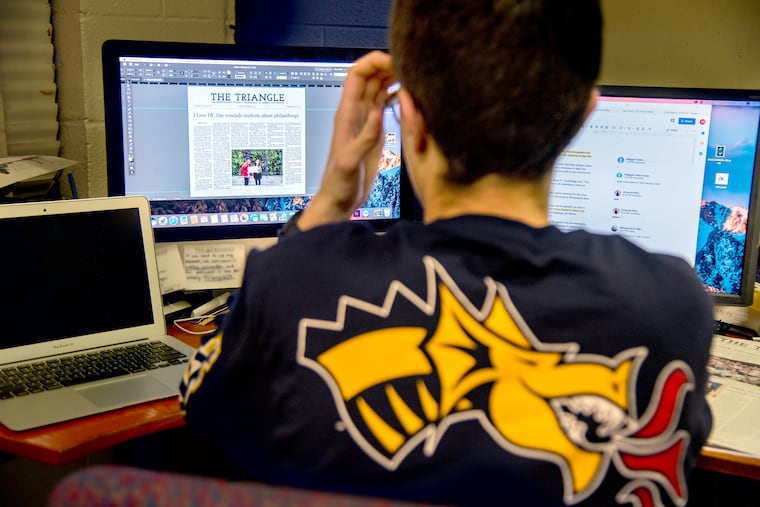Drexel’s student newspaper disappeared for a week. Then, a rush of donations brought it back to life.
Like many student newspapers, the Triangle was hit by market forces: Advertising revenue has plummeted. Around the country, more than half of college newspapers that responded to a 2018 College Media Association survey indicated they had to reduce print schedules in the previous year.

At Drexel University, the student editors called it “the Triangle’s Week of Begging.”
It’s what happened when the university’s student newspaper ran out of money and for the first time at least in the last few decades couldn’t publish the weekly Triangle.
“It’s no joke,” the editors wrote in a Jan. 25 front-page story. “The gravity of the situation is dire.” Advertising is the sole source of revenue for the paper, which has a circulation of 3,200.
The newsstands at the home of the Dragons were bare on Feb. 1, coincidentally the 93rd anniversary of the Triangle’s first issue.
But that didn’t last long.
The university’s office of institutional advancement — its fund-raising arm — rushed to the rescue and purchased advertising so that the paper could publish Feb. 8. And the same office took over the newspaper’s fund-raising drive.
By late last week, nearly $15,500 of the Triangle’s $16,000 goal had been raised. More than 330 alumni, students, and staff contributed $1 to $1,000, said Lizz Miller, director of the Drexel Fund.
Students were heartened.
“We got this outpouring of support from all over the university," said Mike Avena, editor-in-chief. “It buys us enough time to figure out how to fund this paper ourselves. ... Those strategies take time to develop.”
School officials said they consider the student newspaper an important tradition and campus voice for students, one worth saving.
“A successful university is partially connected to a strong student newspaper," said Subir Sahu, vice president and dean of student life.
His comments come even after the Triangle has written some hard-hitting pieces over the last year, including ones on an administrator who was admonished by a previous employer for allegations of sexual harassment, a fraternity that was suspended, and a court case involving an alumnus who shot and killed someone near campus.
The institutional advancement office plans to continue fund-raising for the paper even after the initial goal is reached, “so they have some breathing room to work on a sustainable strategy,” said Miller, a 2013 alumna and Triangle reader.
The donation page is thetriangle.org/donate.
By Thursday evening, things were humming in the Triangle’s third-floor offices in MacAlister Hall, 33rd and Chestnut Streets. Under strings of holiday lights, students laid out pages, edited stories, and readied the “AJ the Dragon” strip for the comics section in the next day’s paper.
Hayley Roth, 23, a biomedical engineering major, was finishing the sports section, including a story about the women’s basketball team, on an eight-game win streak.
“It was like a roller coaster,” said the Meredith, N.H., native, describing the last few weeks. “Now, we’re at the top, and hopefully we’re going to stay here.”
Like many student newspapers and newspapers overall, the Triangle has been hit by market forces: Advertising revenue has plummeted. Around the country, more than half of college newspapers that responded to a 2018 College Media Association survey indicated they had to reduce print schedules in the previous year. About 70 percent said their revenue was flat or declining, said Chris Evans, association president.
But, he said, a sudden printing cessation, which Drexel experienced, is unusual.
At the Triangle, Avena said he and managing editor Calvin Kiniale, 22, a senior health sciences major from Kenya, knew the paper had only a few thousand dollars left at the end of December, but hoped they could find a way to raise ad revenue. Then, the paper’s business team quit, frustrated by ad sales, said Avena, a senior from East Northport, N.Y.
The week before the paper ran out of money, the editors published a story telling students there would be no paper the next week.
“I had a bunch of people in class ask me what happened,” said Virginia Tanner, 23, a senior biomedical engineering major. “I didn’t really realize how many people knew about us or read the Triangle. I was like, wow, they actually care.”
Almost all of the Triangle’s costs go to printing, which amounts to $35,000 to $40,000 each year. The more than 100 staffers work free. The paper hasn’t taken any money from Drexel and maintains editorial independence.
The staff knows there is room for improvement.
Alumni reviewed the print paper and offered suggestions, some of which the staff plans to implement: A more balanced opinion section. Harder-hitting news articles. More in-depth sports coverage. And stories on concerts and events before they happen, so people can go.
Last week, the paper sponsored an opinion-writing workshop for writers, said Avena, an information systems major, who envisions a career in media.
Some of those who donated also had suggestions, including more focus on the digital product.
A team of university leaders, too, is meeting with the staff weekly, looking at how to improve the business model and help the paper better engage with student readers, many whom go off campus to work co-op jobs, a hallmark of Drexel’s education.
The paper has had some hits: One of its most popular pieces — it got more than 10,000 clicks — was about the school’s switch in food-service providers.
“Everyone thought that the dining hall food was really bad, so everyone was really excited,” Avena said.
There will be more like that to come, Avena said.
The banner headline in its Feb. 8 return issue was: “You brought us back — and it won’t be business as usual."